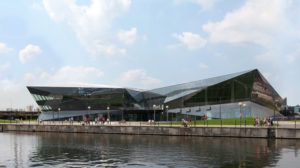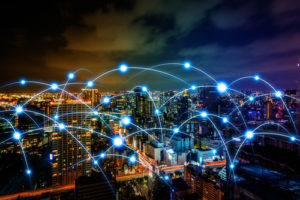How Will the Rise of the ‘Smart City’ Affect the Events Industry?
For many event organisers, the ‘Smart City’ will soon become an important decision-making factor. If a city can offer a smoother transport infrastructure, intelligent hotels for more personalised delegate experiences, or smarter parking solutions, then this will always give an edge over other cities in the mix. In fact, Harriette Wilmoth, marketing manager at Banks Sadler, says the agency is already seeing a significant rise in clients asking for sustainable solutions. And with more hotels and event spaces adopting this fast-growing intelligent approach, it is becoming easier for organisers to fulfil these requests.
What is a Smart City?
Now on the agenda of many of the world’s top capitals, smart cities are continuing to spring up all over the world with Singapore, Stockholm, Boston and Copenhagen currently leading the pack; all with the ambition to build safer, healthier and more efficient environments.
So, what is a Smart City? Smart cities use data and technology to create efficiencies, improve sustainability, create economic development, and enhance quality of life factors for people living, visiting and working in the city. This could come in various iterations, from driverless vehicle technology, to automated parking structures currently found in LA, to Ericsson powering Dallas’s smart city traffic solution.
Google’s holding company Alphabet recently announced their plans to turn a disused area of Toronto into a smart city district. Their plans involve monitoring everything from rubbish bins, to traffic lights, and habitants could expect almost every part of their new environment to be connected. The area will be home to Google’s Canadian headquarters, and they hope, when completed, will offer a more efficient and heavily automated urban environment. Hello Big Brother!
Why Do Smart Cities Matter for Events?
For event organisers, especially of the large-scale congresses/expos, the Smart City will soon become a decision-making factor. If a city can offer a smoother transport infrastructure, intelligent hotels for a more personalised delegate experience, or smarter parking solutions, then this will always give an edge over other cities in the mix. Furthermore, the Smart City can also support on many other social and economic factors such as refuse management, intelligent housing, and crime reduction; all leading to a more harmonious, safer and efficient place to live, work and visit.
 But smart spaces aren’t just about having high-end technology. Let’s take Crystal, The Sustainable Cities initiative by Siemens, as an example. It houses 14 event spaces and uses solar power and ground source heat pumps to generate its own energy. This building was the first of its kind in London and since then, there has been a significant rise in smarter spaces – from hotels using chatbot concierge systems to connected spaces that optimise heating, music and lighting for a far better guest experience.
But smart spaces aren’t just about having high-end technology. Let’s take Crystal, The Sustainable Cities initiative by Siemens, as an example. It houses 14 event spaces and uses solar power and ground source heat pumps to generate its own energy. This building was the first of its kind in London and since then, there has been a significant rise in smarter spaces – from hotels using chatbot concierge systems to connected spaces that optimise heating, music and lighting for a far better guest experience.
For events, when using smart venues, the ability to use large spaces that can be configured to the needs of the audience, a more robust approach to catering and food management, as well as contactless payment and safer travel will always be of great appeal to the organiser; driving savings and an enhanced delegate experience.
Smart hotels are becoming more every day, as companies realise the potential to not only give the guest a more tailored experience but also tap into the wealth of data that comes with a connected hotel. Marriott recently announced its partnership with Samsung to develop the industry’s first Internet of Things hotel room; a smart hotel room designed to show ‘the hotel experience of the future’. This new style of room will allow guests to use a mobile app or their voice to control the temperature, request additional housekeeping services, start the shower at a desired temperature or ask a virtual assistant for a wake-up call.
 A city’s transport system can also be the make or break of an event. Especially for large-scale events such as the Olympics, this sudden increase in footfall can cause chaos for a city’s transport infrastructure and become a frustration for delegates for the duration of an event. Intelligent transportation networks can significantly ease congestion, whether through electronic payments, advanced traffic light systems, driverless vehicles routed to avoid congestion or tube sensors that can identify which carriages are the least busy and relay this to the next station. Smart parking technology is already being rolled out across many cities, allowing drivers to view vacant on-street spaces and pay through their app; a huge benefit to those travelling by car to an event. The impending arrival of 5G will also fully enable the Smart City. With the huge amounts of data required to operate an intelligent city, 5G will be the next step needed for this massive increase in data load to be handled.
A city’s transport system can also be the make or break of an event. Especially for large-scale events such as the Olympics, this sudden increase in footfall can cause chaos for a city’s transport infrastructure and become a frustration for delegates for the duration of an event. Intelligent transportation networks can significantly ease congestion, whether through electronic payments, advanced traffic light systems, driverless vehicles routed to avoid congestion or tube sensors that can identify which carriages are the least busy and relay this to the next station. Smart parking technology is already being rolled out across many cities, allowing drivers to view vacant on-street spaces and pay through their app; a huge benefit to those travelling by car to an event. The impending arrival of 5G will also fully enable the Smart City. With the huge amounts of data required to operate an intelligent city, 5G will be the next step needed for this massive increase in data load to be handled.
The ‘Rise of the Smart City’ features in Banks Sadler’s Top 10 Event Tech Trends of 2018
Enjoyed reading this article? Sign up to our EventTech Talk newsletter for similar insights and weekly updates on the latest technology trends, discussions and debates shaping our industry today.

